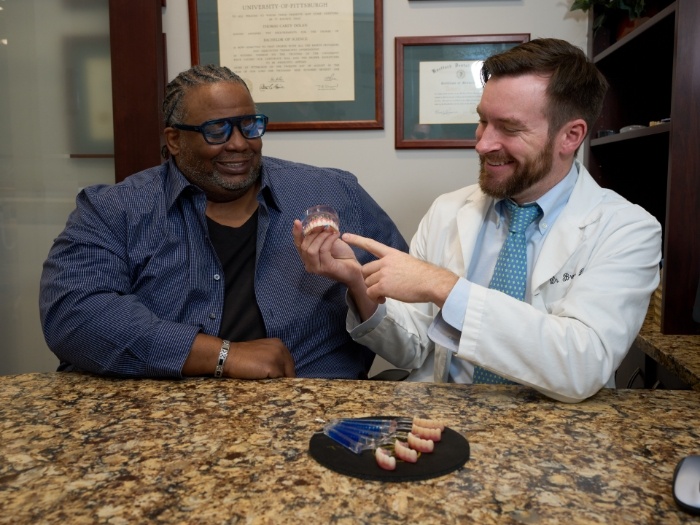Dentures Wethersfield
Reliable & Lasting Tooth Replacement

When it comes to tooth replacement, dentures are the oldest solution still available today. Thankfully, these prostheses have greatly improved over time, providing modern, reliable coverage for countless patients who’ve suffered extensive tooth loss. If you’re interested in undergoing a denture consultation, please give Dolan Dental Group a call today! Our Wethersfield team looks forward to meeting you and helping you regain a confident, functional smile.
Why Choose Dolan Dental Group for Dentures?
- Immediate Dentures Available
- In-Office Dental Implant Placement
- State-of-the-Art Technology
What Are the Types of Dentures?

Depending on each patient’s unique needs, our doctors may recommend full or partial dentures. Partial dentures are designed to recreate certain teeth along an arch of the mouth, while full dentures replace the entire arch. Both styles of dentures are designed to be removable in nature, which makes cleaning and storage more convenient.
Additionally, there are two different styles of full dentures: conventional and immediate. Conventional dentures are designed to be placed within the mouth after the patient’s remaining teeth have been removed and their oral tissue has healed successfully. This means that in the months between, the patient will be without teeth. Alternatively, immediate dentures are designed and crafted before the teeth are removed so that they can be placed directly after the procedure. Because the mouth will change shape as healing takes place, patients will need to schedule a follow-up visit at Dolan Dental Group so that we can refit their dentures later on.
Last but not least, implant dentures are an excellent option for patients who are looking for more permanence in their tooth replacement. By anchoring your new prosthesis securely in place within the mouth, the device feels and looks more natural than ever before!
What Should I Expect After Getting My New Dentures?

It is likely that you will need some time to adjust to the feel of your new full or partial denture. Many patients struggle to find the proper resting place for their tongue, or they may think the device is too bulky and loose. However, over time, you should become fully adjusted to eating and speaking properly with the denture in place.
It is also very important for patients to treat a denture just like it’s a set of natural teeth. This means that daily brushing to remove trapped food and bacteria is a necessity. After the denture is removed from the mouth, it’s important to place it into a glass that contains either denture cleaning solution or water at room temperature; avoid hot water, as it can warp the design of the denture!
If you’re struggling with dentures that simply don’t feel right even after weeks have passed since you received them, please don’t hesitate to reach out to our Wethersfield, CT location. Our doctors will work with you to help determine the problem and provide the necessary adjustments.
The Benefits of Dentures

If you’ve lost a few or many teeth, completing daily tasks such as eating, speaking clearly, and smiling confidently can become much more challenging. Luckily, dentures are a life-changing way to replace lost teeth while restoring a patient’s smile as well as their chewing and speaking ability. Here’s a brief guide to the benefits of replacing your lost teeth with high-quality dentures from Dolan Dental.
Psychological Benefits

Being able to chew and speak confidently can make all the difference in social situations, and people who have lost all their teeth often have a hard time accepting their altered smiles. This can cause issues such as reduced self-esteem, less willingness to engage socially, and a greater risk of sadness or depression. Dentures can restore the appearance and function of a smile after tooth loss, which can greatly increase a patient’s self-esteem and confidence.
Clearer Enunciation

The teeth play a significant role in how the human mouth forms the sounds that make up words, and tooth loss can make speaking clearly more difficult. Since dentures work in place of your missing teeth, they can make it much easier to enunciate during speech. While you may have a slight lisp when you first start wearing dentures, this problem is temporary and will disappear after you get more practice.
Improves Nutrition

Many nutritious foods such as fibrous steaks, crunchy nuts, or raw fruits and veggies are tough in texture, meaning that they require more chewing power to be eaten properly. Those who have lost teeth often experience issues like indigestion due to insufficiently chewing their food or malnutrition due to an inability to eat nutritious fare. Dentures can allow you to enjoy a tastier and more diverse and nutritious diet than you ever could with missing teeth, which can help you achieve better overall health.
Preserves Oral Health

If some of your natural teeth are still healthy, wearing dentures can prevent them from shifting out of position, which can make them harder to clean, easier to injure, and more prone to infections. Dentures can also redistribute the pressure of chewing, reducing the wear and tear the remaining natural teeth experience.
Expands Opportunities

The smile is one of the first things people notice when they meet someone, and having a beautiful grin can give you a significant edge when it comes to sales, job interviews, or getting promotions. Dentures can help you land that amazing first impression that lets you stand out from the competition or even help you make friends in social situations. One study in 2019 found that people with poor oral health were less likely to be employed, so wearing dentures to present the best grin possible can make all the difference at work.
Understanding the Cost of Dentures

When it comes to dental work, the exact price can vary greatly from patient to patient, and dentures are no exception. Dr. Brendan Dolan or Dr. Riley Gionfriddo can go over the specific details that influence the cost of dentures in Wethersfield during your consultation. Our team can also discuss financing options and the various ways that we can help you enjoy a brand-new smile without breaking the bank.
Factors That Affect the Cost of Dentures

The amount you’ll be expected to pay for your dentures will depend on three main factors:
- The type of denture you’re receiving.
- Any preliminary procedures you need to undergo (gum disease treatment, tooth extractions, bone grafting, etc.).
- The materials used to fabricate your denture, such as acrylic or porcelain.
You might be tempted to choose a denture on the cheaper side just to save some money. However, cheaper is not always better, especially when it comes to your smile. Cheap dentures often fall apart easily and require more frequent replacements that end up costing you more in the long run. For something that you’re going to use every day to eat, speak, and smile, it’s worth investing in a quality solution from your denture dentist in Wethersfield.
Are Implant Dentures More Expensive?

Implant dentures require a surgical procedure and multiple dental implants, so yes, they are more expensive than traditional dentures. As most patients with implant dentures can tell you, though, they’re an investment worth making! Dental implants are embedded in the jaw, so they restore more of your chewing power and prevent your prosthesis from slipping. Implant dentures can also last upwards of 30 years, while conventional ones only last five to seven years at most.
Does Dental Insurance Cover Dentures?

With most dental insurance plans, you can expect some degree of coverage for dentures. They often consider dentures a major restorative treatment that is eligible for coverage at up to 50 percent, but this varies from one plan to the next.
Our team at Dolan Dental Group can help you navigate the details of your plan to make maximizing your benefits easier than ever. We’re even in-network with several popular PPO plans, including Delta Dental, BlueCross BlueShield, Cigna, and MetLife.
Other Options for Making Dentures Affordable

Do you not have dental insurance? Does your plan not provide as much coverage as you would like? Luckily, we have other options for making dentures in Wethersfield affordable. Dolan Dental Group has partnered with multiple reputable financing companies, such as GreenSky and CareCredit, that can help you fund your new smile. Many of these financiers let you break up your treatment costs into monthly payments with very little or even no interest!
Denture FAQs
Should I Have All My Teeth Pulled to Get Dentures?
Repairing a tooth that’s damaged is always a favorable option compared to replacing it. Tooth extractions are only recommended if they are deemed absolutely necessary, like when a tooth is too damaged to save thanks to extensive decay, a severe infection, or trauma that has broken off a large portion of the protective enamel. If all of the teeth in an arch are decayed or infected with gum disease, replacing them with dentures may be a viable, cost-effective option. Ultimately, your dentist will always explore all of your options before recommending extractions for dentures.
Can I Sleep with My Dentures?
Dentists generally recommend that you take your dentures out at night before going to bed. When you first get your dentures, you’ll typically be told to keep them in your mouth for 24 hours, including when you sleep, but after this, you should be taking them out every evening. This is because wearing dentures restricts the circulation in your gums, therefore leading to soft tissue irritation and potentially speeding up ridge resorption. Taking your dentures out gives them a chance to recover and get the nutrients they need during the night. The dark, moist space beneath the dentures is an ideal place for bacteria to thrive, so sleeping with dentures has been found to be associated with a higher risk of pneumonia. In the end, it’s a good idea to take them out before you catch some Z’s.
Will It Hurt to Get Dentures?
If you need to have teeth extracted before you’re able to get dentures, you are likely to experience some discomfort after the oral surgery. Take your prescribed medication as directed to manage pain. When you first receive your new dentures, some minor irritation may occur as your mouth adjusts. If you switch to a new set of dentures, this adjustment process may take longer than before. If the pain persists, give us a call so we can take a look and check for underlying issues.
Is It Hard to Talk with Dentures?
When you first get dentures, it will take time to get used to speaking with them since you’re so used to speaking with your natural teeth. The amount of time it takes to adjust to speaking with dentures varies from person to person, but with some practice, you’ll be talking as you normally do in no time. Try reading out loud to yourself and repeating difficult-to-pronounce words. Speak slowly, as fast speech may come out muffled at first.
